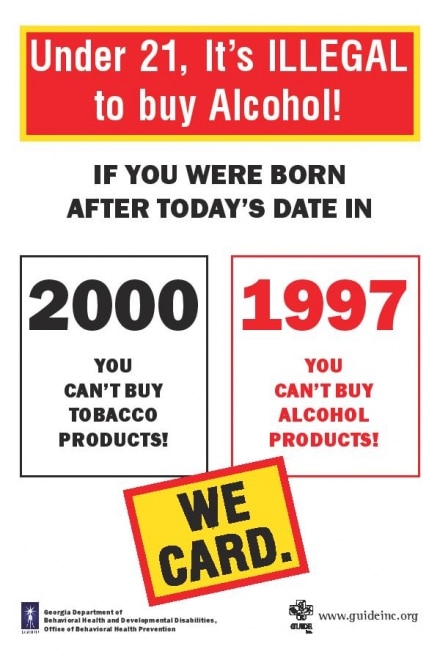As a part of our prevention efforts, GUIDE partners with local police departments to conduct compliance checks in our community to reduce underage retail access to alcohol. During compliance checks, police detectives use underage decoys to monitor which retailers do and do not check for identification or allow an underage person to purchase alcohol. While compliance checks are very effective, retailers who comply with the law are still plagued by one very difficult issue: fake IDs. In the state of Georgia, retailers are not only responsible for checking IDs, they must also ensure that identification is valid and belongs to the person presenting it when purchasing alcoholic beverages.
Fake IDs are not only an issue for the stores selling alcohol, but for the person attempting to purchase alcohol underage. In a 2013 study from the University of Maryland, researchers found that false identification use was linked to high-risk drinking choices for those under the age of 21. This is because the use of fake IDs provides greater accessibility to alcohol, leading these young people to drink more frequently and more heavily. This increase in quantity and frequency is interpreted as a red flag that can signal current or future problems with alcohol.

A combined effort between retailers and parents can help to reduce the prevalence of this issue, as outlined in the Alcohol Retailer Knowledge Base brochure from the Georgia Department of Behavioral Health and Developmental Disabilities (DBHDD). First, retailers are encouraged to compare facial features, take note of the date of birth and the expiration date on the ID, pay attention to the customer for actions that may indicate the customer is being dishonest (like facial expressions, eye movements and body language) and also report any fake identification to a supervisor and law enforcement when present.
Parents are encouraged to talk to teens and young adults about drinking and fake IDs. With almost 2/3 of the college participants in the previously mentioned University of Maryland study using a fake ID to obtain alcohol, it is important that parents talk about the possible consequences related to using a fake ID. These can include fines, suspension of a driver’s license, jail time and an increased chance of alcohol dependence.
With help from retailers and parents, prevention efforts such as compliance checks can be much more effective. Reducing underage retail access to alcohol is truly a joint effort that will serve to make communities healthier and stronger.
